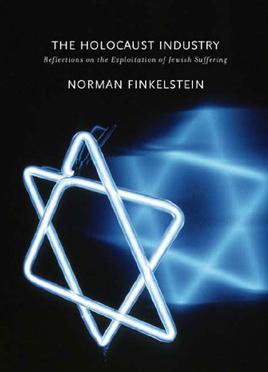
The Holocaust Industry: Reflections on the Exploitation of Jewish Suffering is a 2000 book by Norman Finkelstein arguing that the American Jewish establishment exploits the memory of the Nazi Holocaust for political and financial gain and to further Israeli interests. According to Finkelstein, this "Holocaust industry" has corrupted Jewish culture and the authentic memory of the Holocaust.
The Dershowitz–Finkelstein affair was a public controversy involving academics Alan Dershowitz and Norman Finkelstein and their scholarship on the Israeli–Palestinian conflict in 2005.
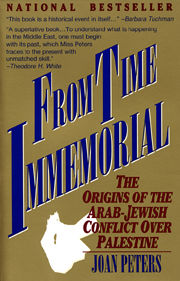
From Time Immemorial: The Origins of the Arab–Jewish Conflict over Palestine is a 1984 book by Joan Peters, published by Harper & Row, about the demographics of the Arab population of Palestine and of the Jewish population of the Arab world before and after the formation of the State of Israel.

Daniel Jonah Goldhagen is an American author, and former associate professor of government and social studies at Harvard University. Goldhagen reached international attention and broad criticism as the author of two controversial books about the Holocaust: Hitler's Willing Executioners (1996), and A Moral Reckoning (2002). He is also the author of Worse Than War (2009), which examines the phenomenon of genocide, and The Devil That Never Dies (2013), in which he traces a worldwide rise in virulent antisemitism.

The Painted Bird is a 1965 novel by Jerzy Kosiński that describes World War II as seen by a boy, considered a "Gypsy or Jewish stray," wandering about small villages scattered around an unspecified country in Central and Eastern Europe. The story was originally described by Kosiński as autobiographical, but upon its publication by Houghton Mifflin he announced that it was a purely fictional account.

Ivor Norman Richard Davies is a British and Polish historian, known for his publications on the history of Europe, Poland and the United Kingdom. He has a special interest in Central and Eastern Europe and is UNESCO Professor at the Jagiellonian University, professor emeritus at University College London, a visiting professor at the Collège d'Europe, and an honorary fellow at St Antony's College, Oxford. He was granted Polish citizenship in 2014.
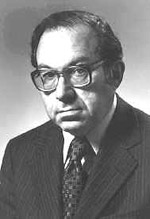
Raul Hilberg was a Jewish Austrian-born American political scientist and historian. He was widely considered to be the preeminent scholar on the Holocaust. Christopher R. Browning has called him the founding father of Holocaust Studies and his three-volume, 1,273-page magnum opusThe Destruction of the European Jews is regarded as seminal for research into the Nazi Final Solution.

This is a selected bibliography and other resources for The Holocaust, including prominent primary sources, historical studies, notable survivor accounts and autobiographies, as well as other documentation and further hypotheses.

Hitler's Pope is a book published in 1999 by the British journalist and author John Cornwell that examines the actions of Eugenio Pacelli, who became Pope Pius XII, before and during the Nazi era, and explores the charge that he assisted in the legitimization of Adolf Hitler's Nazi regime in Germany, through the pursuit of a Reichskonkordat in 1933. The book is critical of Pius' conduct during the Second World War, arguing that he did not do enough, or speak out enough, against the Holocaust. Cornwell argues that Pius's entire career as the nuncio to Germany, Cardinal Secretary of State, and Pope, was characterized by a desire to increase and centralize the power of the Papacy, and that he subordinated opposition to the Nazis to that goal. He further argues that Pius was antisemitic and that this stance prevented him from caring about the European Jews.
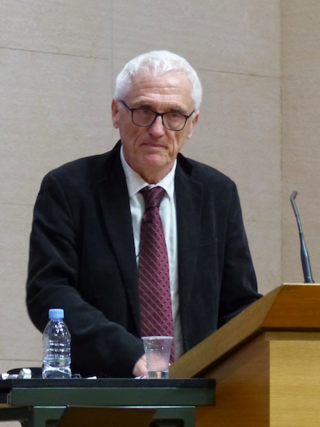
Jan Tomasz Gross is a Polish-American sociologist and historian. He is the Norman B. Tomlinson '16 and '48 Professor of War and Society, emeritus, and Professor of History, emeritus, at Princeton University.

Image and Reality of the Israel–Palestine Conflict is a 1995 book about the Israeli–Palestinian conflict by Norman G. Finkelstein. Finkelstein examines and scrutinizes popular historical versions of the conflict by authors such as Joan Peters, Benny Morris, Anita Shapira and Abba Eban. The text draws upon Finkelstein's doctoral political science work. The 2003 revised edition offers an additional appendix devoted to criticism of Michael Oren's 2002 bestseller Six Days of War: June 1967 and the Making of the Modern Middle East.
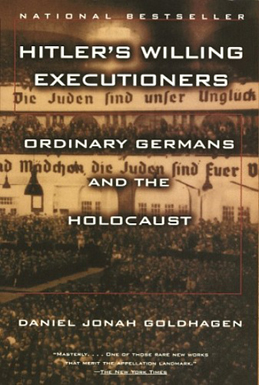
Hitler's Willing Executioners: Ordinary Germans and the Holocaust is a 1996 book by American writer Daniel Goldhagen, in which he argues that the vast majority of ordinary Germans were "willing executioners" in the Holocaust because of a unique and virulent "eliminationist antisemitism" in German political culture which had developed in the preceding centuries. Goldhagen argues that eliminationist antisemitism was the cornerstone of German national identity, was unique to Germany, and because of it ordinary German conscripts killed Jews willingly. Goldhagen asserts that this mentality grew out of medieval attitudes rooted in religion and was later secularized.

Norman Lebrecht is a British music journalist and author who specializes in classical music. He is best known as the owner of the classical music blog, Slipped Disc, where he frequently publishes articles. Unlike other writers on music, Lebrecht rarely reviews concerts or recordings, preferring to report on the people and organizations who engage in classical music. Described by Gilbert Kaplan as "surely the most controversial and arguably the most influential journalist covering classical music", his writings have been praised as entertaining and revealing, while others have accused them of sensationalism and criticized their inaccuracies.

The Holocaust had a deep effect on society both in Europe and the rest of the world, and today its consequences are still being felt, both by children and adults whose ancestors were victims of this genocide.
Peter Novick was an American historian who was Professor of History at the University of Chicago. He was best known for writing That Noble Dream: The "Objectivity Question" and the American Historical Profession and The Holocaust in American Life. The latter title has also been published as The Holocaust and Collective Memory, especially for non-US anglophonic markets.
James Petras is a retired Bartle Professor (Emeritus) of Sociology at Binghamton University in Binghamton, New York and adjunct professor at Saint Mary's University, Halifax, Nova Scotia, Canada who has published on political issues with particular focus on Latin America and the Middle East, imperialism, globalization, and leftist social movements.

Norman Gary Finkelstein is an American political scientist, activist, former professor, and author. His primary fields of research are the Israeli–Palestinian conflict and the politics of the Holocaust. He is a graduate of Binghamton University and received his Ph.D. in political science at Princeton University. He has held faculty positions at Brooklyn College, Rutgers University, Hunter College, New York University, and DePaul University, where he was an assistant professor from 2001 to 2007.

Fred Rosenbaum is an American author, historian and adult educator, specializing in the history of the Jewish community of the San Francisco Bay Area. Rosenbaum has been called a "superb storyteller". He is a founder and the director of Lehrhaus Judaica in Berkeley, California, described as "the largest Jewish adult education center in the western United States".
Ruth Bettina Birn is a Canadian historian and author whose main field of research is the security forces of Nazi Germany and their role in the Holocaust. For nearly 15 years, she held a position of chief historian in the war crimes section at the Canadian Department of Justice. Birn co-authored A Nation on Trial: The Goldhagen Thesis and Historical Truth with Norman Finkelstein.

A neutral state, the United States entered the war on the Allied side in December 1941. The American government first became aware of the Holocaust in German-occupied Europe in 1942 and 1943. Following a report on the failure to assist the Jewish people by the Department of State, the War Refugee Board was created in 1944 to assist refugees from the Nazis. As one of the most powerful Allied states, the United States played a major role in the military defeat of Nazi Germany and the subsequent Nuremberg trials. The Holocaust saw increased awareness in the 1970s that instilled its prominence in the collective memory of the American people continuing to the present day. The United States has been criticized for taking insufficient action in response to the Jewish refugee crisis in the 1930s and the Holocaust during World War II.















